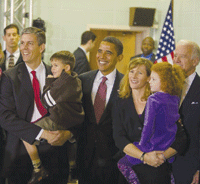 During the presidential election campaign the economy submerged most talk of education. But beneath the surface, a debate churned between self proclaimed education reformers and the teachers’ unions. By appointing Arne Duncan, Chicago’s schools chief and one of his own basketball buddies, as education secretary, Barack Obama has managed to please both sides.
During the presidential election campaign the economy submerged most talk of education. But beneath the surface, a debate churned between self proclaimed education reformers and the teachers’ unions. By appointing Arne Duncan, Chicago’s schools chief and one of his own basketball buddies, as education secretary, Barack Obama has managed to please both sides.
School reformers had been edgy for weeks, noting that Obama’s transition team included Linda Darling-Hammond, an education professor at Stanford University. Ms. Darling-Hammond is a vocal critic of No Child Left Behind (NCLB), the federal law that promotes testing and accountability. Many feared that she would nudge Obama towards the unions (which favour easy-going government dispensed school education) or even become education secretary herself.
If Darling-Hammond represents one end of the debate, at the other extreme are Joel Klein and Michelle Rhee, chancellors of the school systems of New York and Washington D.C, respectively. Both have supported charter (independently-run but government-funded) schools and paying teachers by results. Both have championed tough accountability. But both have infuriated unions, and Obama has opted not to pick a fight.
Chester Finn of the conservative Thomas B. Fordham Institute calls Duncan “a terrific pick”, and Margaret Spellings, George Bush’s education secretary, calls him “a kindred spirit”. Even Randi Weingarten, president of the American Federation of Teachers, declared herself “pleased” by the choice. The worry is that the effort to reach consensus may hinder bold change. But at least Duncan may restore the spirit of co-operation that helped pass NCLB in 2001. Obama, in his announcement, criticised advocates who fail to realise that “both sides have good ideas and good intentions”. The president-elect is a master at charting the middle road. Time will tell whether that path leads to meaningful reform or to messy drift.
Agents coming in from the cold
Although the united states takes a bigger share of the international student market than any other country, with 22 percent of the total, it under-performs in relation to its size. Just 3.5 percent of students on its campuses are from abroad.
What explains this? Certainly not the quality of education on offer, which is often superb. One huge factor is the way American universities shun intermediaries whose services are used by most students wanting to study abroad. Markus Badde, chief executive of ICEF, a student recruitment consultancy, says two-thirds of the world’s border-crossing students, and almost all of those from Asia, turn to ‘agents’ to find a university place. But hardly any important American institution will pay intermediaries.
“There is a real hostility in this country to the use of agents,” says Mitch Leventhal, vice-provost for international affairs at the University of Cincinnati. “Some universities think it is illegal — it’s not; what’s illegal is recruiting American students via agents. Some think it’s unethical — but it’s only unethical when done unethically. We know that many students, perhaps half of all undergraduate Chinese students, for example, have paid advisers at home to help them. We have no idea what that help consists of.”
Leventhal, the founding president of the American International Recruitment Council, a new non-profit organisation formed by a group of educational institutions, hopes such attitudes will alter. To join the network, recruitment agents will have to accept a code of practice and get regular training. The organisation hopes American universities will be sufficiently convinced of the quality and ethical standards of member agents that they will agree to work with them. Already 35 universities have joined; the figure should reach 100 soon. The council is working on a trial basis in Bangkok and hopes to process “large numbers” of agents by the end of 2010.
If that happens, the market in international students will be transformed. A survey carried out by i-graduate, a market-research firm, found that although few agents recommended American institutions to their clients, most wanted to. “Agents said the United Kingdom was the country in which they placed the most students,” according to Will Archer, the firm’s director. “But they said the country in which they would most like to place students is the United States.”
Leventhal insists that there are lots of students to go round. But he concedes that academics in other countries are not thrilled by the American plans. “Their hair is on fire,” he says. “They’re saying, ‘Oh my God, the Americans have finally figured it out, they’re going to kill us.’ ”
(Excerpted and adapted from The Economist & Times Higher Education)